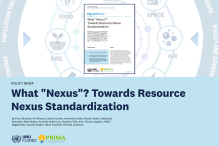The central purpose of this dissertation is to unravel the different ways in which learning happens in Low and Middle Income countries; this, from both the students' and educational institutions' perspective. It focuses on the formation of non-cognitive skills, especially aspirations, and on the provision of education during hard times. The mechanisms through which learning is acquired, shared, and supported influence the human capital accumulation of countries, and provide insights for optimal educational and economic development policies for their communities. I motivate this dissertation and provide chapter summaries in Chapter 1. Chapter 2 examines the role of aspirations on the education and labour outcomes of young people from disadvantaged backgrounds and in low and middle-income countries. It develops a framework for mainstreaming aspirations in development policies. Chapter 3 builds on the concept of aspirations in education, and introduces us to the concepts peer networks and peer effects. It provides experimental evidence of the impact of a role model and informational video-intervention on the malleability of educational aspirations of young Mexican students, and the interdependence of the endurance of this effect and peer social networks. Chapter 4 looks at the safe provision of higher education during a pandemic. It proposes a welfare-maximising algorithm to allocate scarce testing resources, and invite healthy individuals for face-to-face learning. Importantly, welfare was defined as a multidimensional assessment that considers economic and social, and socio-emotional/psychological elements. It provides experimental evidence of the effectiveness of our resource-optimal testing allocation mechanism, and suggests that to uphold the provision of education during a pandemic it is important to prioritise needs from a multidimensional perspective. Chapter 5 continues to explore the dynamics of education provision during hard times. It explores the determinants of low-income student retention in higher education. It bridges the two perspectives explored in previous chapters: that of the students' needs and non-cognitive abilities, and the role of educational institutions in upholding the provision of education during hard times. Our findings point to the relevance of both for educational resilience, but highlight that academic resilience is primarily driven by non-cognitve skills (referred to as fitness in the chapter), directly followed by institutional action. Finally, Chapter 6 concludes the dissertation by providing key findings, policy implications, limitations and suggestions for further research.
Degree Defense
Learning in low and middle-income countries: Essays in Development and Education Economics
PhD defence Michelle González Amador
Related content
Media Coverage
Middle Powers are no Longer Supporting Cast in Global Development
In Devex, Nicole Goldin says global development’s future may hinge less on major powers and more on collaboration among middle powers.



